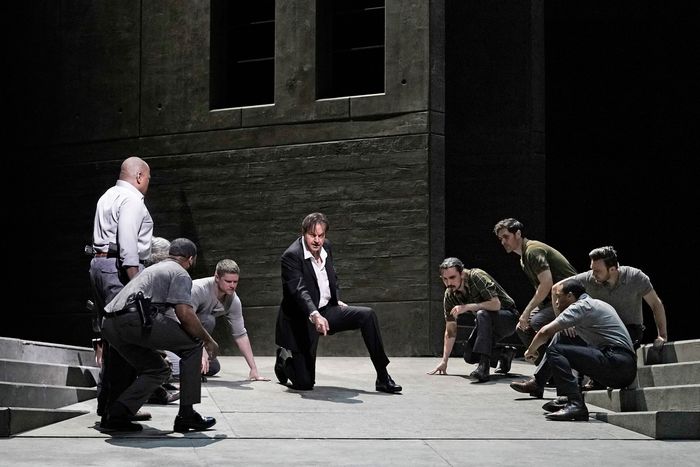
If you’re going to select the perfect entertainment to cap a day when a sociopathic and unrepentant sexual abuser is finally held to account, you could do worse than Don Giovanni. Mozart and his librettist Lorenzo Da Ponte knew the type, and they were not about to cut him any slack. The opera opens with an attempted rape and a successful murder and ends with a “Ding-Dong, the Witch Is Dead”–type ensemble. Everything that happens between those poles, the complex mixture of cynicism, wit, charm, and brutality, poses all sorts of moral and theatrical problems. Are we, the audience, complicit if we thrill to orchestration that is far more brilliant and sophisticated than any of the characters it brings to life? Do we dare to melt at the young bride’s affectionately masochistic — and musically seductive — invitation to her groom (“Beat me, dear Masetto / Beat your poor Zerlina”)? Sexual violence isn’t funny, romantic, or sublime, but Mozart’s score is all those things, a contradiction that made the opera uncomfortable long before Me Too.
In the Metropolitan Opera’s new production, the director Ivo van Hove — making his Met debut — resolves that tension in one way, and the cast chooses another. I have rarely seen a staging that suffers from such an obvious chasm between concept and execution. The curtain goes up on a concrete construction site designed by Jan Versweyveld, a village of raw, vaguely fascistic structures that seems designed for zombies. Smoke rises from the stage like the sulfurous exhalations of hell. The light (also by Versweyveld) is either glaring or grudging and often out of sync with the plot: Characters fail to recognize each other in daylit brightness. Costume designer An D’Huys dresses both the flamboyant aristocrat and his servile sidekick Leporello in funeral suits. Swapping identities is just a matter of handing over a gray trench coat and a black tie. The setting doesn’t so much suggest a seducer on the prowl as a pair of gangsters looking to dismember an informant.
Within these dour confines, the conductor Nathalie Stutzmann tends to Mozart’s music like a gardener growing orchids in a prison yard. It’s not easy work, partly because Peter Mattei, despite his supple baritone and long experience, struggles with the title role, or at any rate with an interpretation of it he has not internalized. On the surface, this Giovanni goes about his scheming like a man prepping for a weekly sales meeting. For the Don, even sexual self-indulgence has grown stale, and cruelty has lost its magic. But this is too long an opera for a tired man to carry, and Mattei knows it. You can feel him aching to let the character’s charisma out for a gallop. Again and again, he makes his chafing audible, willing the seduction duet “La ci darem la mano” to shed a few sparks, berating Leporello with clever hauteur, greeting party guests with strategic affability. Yet even as the forces of justice close in and an emissary from the beyond comes to claim his soul, the strongest emotion he manages to project is irritation.
Fortunately, van Hove may have been too busy figuring out how to squander Mattei’s gifts to pay much attention to the rest of the cast. There’s a lot of musical talent onstage and in the pit, which Stutzmann manages with aplomb, turning in a performance that is light on brimstone and rich with easy grace. Adam Plachetka sings Leporello with traditional verve and plays him like a mob boss’s bumbling enforcer. Ben Bliss brings unusual depth of feeling and a liquid tenor to the role of the perpetually frustrated Don Ottavio. Ying Fang is brisk and insouciant as Zerlina, though she too sometimes seems to be beating her wings against a windowpane. Among the trickiest roles to salvage is that of Elvira, who swings between a desire for revenge and just plain desire and has a knack for bursting in on other people’s flirtations. Ana María Martinez sings her with dignity but a touch of vocal strain that seems to aggravate Giovanni’s impatience.
Don Giovanni has one of the trickiest finales in opera, a convergence of the comic and the chilling, of sensuality and retribution. Mozart keeps these elements in equilibrium, weaving Leporello’s inane patter through tolling minor chords and implacable trombones. Van Hove has Mattei throw pasta and juggle rolls. Unable to square the score’s internal tensions, the director simply ignores them. That surrender strands the singers, who keep valiantly delivering while attention shifts to writhing demons projected on the set. That’s a great visual stroke designed by Christopher Ash, but it winds up feeling like the point of the whole heartless affair, an anonymized vision of hell looming ever closer while all the puny human drama gets swallowed in a burst of smoke.
Don Giovanni is at the Metropolitan Opera through June 2.





